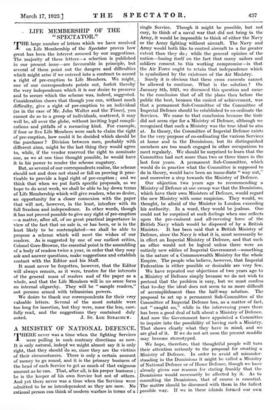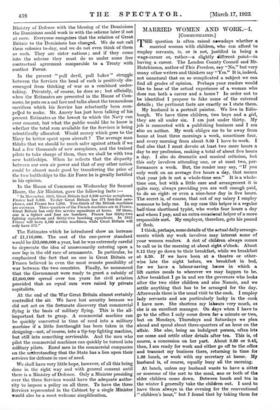A MINISTRY OF NATIONAL DEFENCE.
THERE never was a time when the fighting Services were pulling in such contrary directions as now. It is only natural, indeed we might almost say it is only right, that they should do so, since they are the victims of their circumstances. There is only a certain amount of money to go round, and it is the primary business of the head of each Service to get as much of that exiguous amount as he can. That, after all, is his proper business ; he is the keeper of his own Service but not of others. And yet there never was a time when the Services were admitted to be so interdependent as they are now. No rational person can think of modern warfare in terms of a single Service. Though it might be pOssible, but not easy, to think of a naval war that did not bring in the Army, it would be impossible to think of either the Navy or the Army fighting without aircraft. The Navy and Army would both like to control aircraft to a far greater extent than they do ; while the general opinion of the nation—basing itself on the fact that many sailors and soldiers consent_ to this working compromise—is that the Air Force ought to retain that independence which is symbolized by the existence of the Air Ministry.
Surely it is obvious that these cross currents cannot be allowed to continue. What is the solution ? On January 8th, 1921, we discussed this question and came to the conclusion that of all the plans then before the public the best, because the easiest of achievement, was that a permanent Sub-Committee of the Committee of Imperial Defence should be established to co-ordinate the Services. We came to that conclusion because the time did not seem ripe for a Ministry of Defence, although we recognized that such a Ministry was the true ideal to aim at. In theory, the Committee of Imperial Defence -exists for the very purpose of co-ordinating the various Services at home and in the Dominions, but its distinguished members are too much engaged in other occupations to meet regularly. We should be surprised to learn that the Committee had met more than two or three times in the last four years. A permanent Sub-Committee, which would do in practice what the Committee- is supposed to do in theory, would have been an immediate " way out," and moreover a step towards the Ministry of Defence.
Our objection two years ago to recommending a Ministry of Defence at one swoop was that the Dominions, which have their own Ministers of Defence, would regard the new Ministry with some suspicion. They would, we thought, be afraid of the Minister in London exceeding his authority. In a word, they would be jealous. One could not be surprised at such feelings when one reflects upon the pre-eminent and all-covering force of the British Navy which would be disposed of by a British Minister. It has been said that a British Ministry of Defence, since the Navy is what it is, must necessarily be in effect an Imperial Ministry of Defence, and that such an office would not be logical unless there were an entirely new edifice of Imperial Government—something in the nature of a Commonwealth Ministry for the whole Empire. The people who believe, however, that Imperial Federation is either possible or desirable are very few.
We have repeated our objections of two years ago to a Ministry of Defence simply because we do not wish to pretend that the problem is easy, but we must confess that to-day the ideal does not seem to us more difficult of accomplishment than the half-way solution. The proposal to set up a permanent Sub-Committee of the Committee of Imperial Defence has, as a matter of fact, not " caught on," while in the intervening years there has been a good deal of talk about a Ministry of Defence. And now the Government have appointed a Committee to inquire into the possibility of having such a Ministry. That shows clearly what they have in mind, and we are glad of it. If we do not act soon the present muddle may become stereotyped.
We hope, therefore, that thoughtful people will turn their attention seriously to the proposal for creating a Ministry of Defence. In order to avoid all misunder- standing in the Dominions it might be called a Ministry of National Defence or of Home Defence, though we have already given our reasons for stating frankly that the Dominions would necessarily be affected by it. As to consulting the Dominions, that of course is essential. The matter should be discussed with them in the fullest possible way. If we in these islands formed our own Ministry of Defence with the blessing of the Dominions the Dominions could work in-with the seheme later.if not at once. Everyone; recognizes that the relation of Great_ Britain to the Dominions has changed.. We do not call them colonies to-day, and we do not even think of them as such. They arc sister nations ; and if they come into the scheme they must do so under some free contractual agreement comparable to a Treaty with another Power.
In the present- "pull devil, pull baker" struggle between the Services the head of each is positively dis- couraged from thinking of war as a combined under- taking. Privately, of course, he does so ; but officially, when the Estimates are presented in the House of Com- mons, he puts on a sad face and talks about the tremendous sacrifices which his Service has reluctantly been com- pelled to make. Mr. Amery has just been talking of his present Estimates as the lowest to which the Navy can ever consent, but what the public would like to know is whether the total sum available for the Services is being scientifically allocated. Would money which goes to the Navy be better spent upon aircraft ? The average man thinks that we should be much safer against attack if we had a few thousands of new aeroplanes, and the trained pilots to take charge of them, than we shall be with-two new battleships. When he reflects that the disparity between our own air power and that of any other nation could be almost made good by transferring the price of the two battleships to the Air Force he is greatly fortified in his opinion.
In the House of Commons on Wednesday Sir Samuel Hoare, the Air Minister, gave the following facts :- " In November, 1918, Great Britain had 3,300 service aeroplanes, France had 8,600. To-day Great Britain has 371 first-line aero- planes, and France has 1,260. Two-thirds of the British machines are overseas. Three-quarters of the French machines are in France. Great Britain has only five service squadrons at home. Of those, one is a fighter and four are bombers: France has thirty-two fighting squadrons and thirty-two bombing squadrons. In 1925 France will have 2,180 service machines, while Great Britain will only have 575."
The Estimates which he -introduced show an increase of L1,116,000. The cost of the one-power standard would be £85,000,000 a-year, but he was extremely careful to • deprecate the idea of unnecessarily entering upon a new lap • in the -old race -of armaments. In particular, he emphasized the fact- that no one in Great Britain or France believed in even the most remote possibility of war between the-two-countries. Finally, he announced that the Government- were ready to grant a •subsidy of LI;000,000- spread over- ten years for civil aviation provided that an equal'. sum were raised by private capitalists.
A't the end of the War Great Britain almost certainly controlled the air. We have lost security because we did not act on the fortunate discovery that commercial flying is the basis of military flying. This is the all- %important fact' to grasp. A- commercial machine can be quickly converted- in time of need into a military maehine if a little forethought- has been taken in the designing—not; of bourse, into a tip-top fighting machine, but still into something serviceable. And the men who pilot the commercial machines can quickly be turned into military pilots. Enrol men in the commercial companies on the untlerstanding that the State has a lien upon their services for defeneein case of need.
We shall have very little hope, however, of all this being done in the right- way, and with general consent until there is a Ministry of Defence. Only a Minister presiding, over the three Services would have the adequate autho- rity to impose a policy on all three. To have the three Services represented in the Cabinet by a single Minister would also be a most welcome simplification.











































 Previous page
Previous page